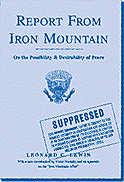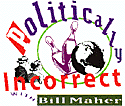
If you’re walking into your local bookstore looking for some good political and social satire, you might consider bringing a machete along for the trip. After cutting through a dense thicket of  flavor-of-the-month parodies (Barking at Prozac, Daily Negations, Primary Whites, Al Franken is a Bucktoothed Moron) and the latest entries in the Truly Tasteless Jokes series, it might seem like all that’s left are a few P.J. O’Rourke books and Doonesbury collections. If you’re looking for the caustic, muckraking satire that characterized H.L. Mencken’s Baltimore Sun days, or even Max Shulman’s lighthearted postwar ruminations, most readers will have a tough go of it.
flavor-of-the-month parodies (Barking at Prozac, Daily Negations, Primary Whites, Al Franken is a Bucktoothed Moron) and the latest entries in the Truly Tasteless Jokes series, it might seem like all that’s left are a few P.J. O’Rourke books and Doonesbury collections. If you’re looking for the caustic, muckraking satire that characterized H.L. Mencken’s Baltimore Sun days, or even Max Shulman’s lighthearted postwar ruminations, most readers will have a tough go of it.
So what happened? A misshelving I’d spotted provided part of the answer: The New Republic Guide to the Candidates, 1996, a collection of essays by the likes of Morton Kondracke and Ruth Shalit — folks guaranteed to not make you snort milk out your nose — made it into the humor section simply because of its cover, rendering the candidates’ faces on Joker cards. It’s a conceit that makes a subtle but effective point: most often, today’s politics is its own self-parody. After all, you don’t need much comic genius to find the humor in somebody like Bob Dornan, and while the antics of Jesse Helms are exasperating on a serious level, you don’t need a comedian to point out how absurd they are.![]()
Another problem is our political system’s rush to embrace the soundbite, and  soundbite culture tends to result in soundbite humor — often no longer or deeper than the average political cartoon — though artists like Tom Tomorrow have done surprisingly deep and funny work with such limited space. Being subtle and thorough about your jokes these days isn’t just difficult, it’s dangerous: look at what happened when a few militiamen got hold of Report From Iron Mountain (which, incidentally, I found in “Current Affairs”), a book intended to skewer conspiracy-seekers that’s now a guidebook for anyone who believes that Large, Black Government Airplanes Are Watching Over Us. Or worse still, carrying a papier-mache effigy of Slobodan Milosevic in Belgrade these days is bound to get you arrested, beaten, or both.
soundbite culture tends to result in soundbite humor — often no longer or deeper than the average political cartoon — though artists like Tom Tomorrow have done surprisingly deep and funny work with such limited space. Being subtle and thorough about your jokes these days isn’t just difficult, it’s dangerous: look at what happened when a few militiamen got hold of Report From Iron Mountain (which, incidentally, I found in “Current Affairs”), a book intended to skewer conspiracy-seekers that’s now a guidebook for anyone who believes that Large, Black Government Airplanes Are Watching Over Us. Or worse still, carrying a papier-mache effigy of Slobodan Milosevic in Belgrade these days is bound to get you arrested, beaten, or both.
Intuitively understanding all this, cable network Comedy Central’s popular series “Politically Incorrect” (which recently moved on to ABC) spends less time skewering politics and more time poking fun at  the political process itself. It’s the most straightforward way to get a laugh: during the GOP convention, the channel made sure that correspondent and former SNL comedian Chris Rock stopped Senator Strom Thurmond to chat for a bit (MTV did the same thing with Public Enemy’s Chuck D) — and put Al Franken in bed with Arianna Huffington — ideas that, for ease of quick results, have shooting fish in a barrel for good company. Funny as it is, “Politically Incorrect” isn’t about enlightening the public through humor; it’s about knowing that the AquaNetted glam-metal star on the right will probably say something more trenchant than the GOP campaign aide on the left.
the political process itself. It’s the most straightforward way to get a laugh: during the GOP convention, the channel made sure that correspondent and former SNL comedian Chris Rock stopped Senator Strom Thurmond to chat for a bit (MTV did the same thing with Public Enemy’s Chuck D) — and put Al Franken in bed with Arianna Huffington — ideas that, for ease of quick results, have shooting fish in a barrel for good company. Funny as it is, “Politically Incorrect” isn’t about enlightening the public through humor; it’s about knowing that the AquaNetted glam-metal star on the right will probably say something more trenchant than the GOP campaign aide on the left.
Since the humor business is indeed a business, it’s worth noting that subtle satire isn’t a terribly profitable venture: Tim Robbins’ excellent ![]() John Birch-via-Bob Dylan satire of the campaign trail, Bob Roberts, won accolades both from critics and a loyal cult, but had trouble migrating away from the arthouses into the mainstream. Likewise, some of the more caustic cartoonists around — the aforementioned Tom Tomorrow, Callahan, Lalo Alcaraz, and Jules Feiffer — rarely find their work presented outside the highly-respected but
John Birch-via-Bob Dylan satire of the campaign trail, Bob Roberts, won accolades both from critics and a loyal cult, but had trouble migrating away from the arthouses into the mainstream. Likewise, some of the more caustic cartoonists around — the aforementioned Tom Tomorrow, Callahan, Lalo Alcaraz, and Jules Feiffer — rarely find their work presented outside the highly-respected but  poorly-paid network of free weeklies. The facts are especially frustrating when you see Dana Carvey shoot to stardom for sounding like George Bush, or listen to bowtied PBS hack Mark Russell struggling to fit the word “philanderer” into some showtune yet again.
poorly-paid network of free weeklies. The facts are especially frustrating when you see Dana Carvey shoot to stardom for sounding like George Bush, or listen to bowtied PBS hack Mark Russell struggling to fit the word “philanderer” into some showtune yet again.
Given that, Michael Moore‘s meteoric rise to success with Roger & Me held out hope to many that you could have it both ways: you could make a firm and powerful political statement on social injustice, and you could make a  damn funny documentary as well. Moore did it by playing a character that the average citizen loves to watch the most: the average citizen, unassuming and certain that if General Motors CEO Roger Smith could only take a look at the wrecked lives he helped create, he’d reopen the factories in Flint, Michigan. Roger & Me, and its follow-up TV show, “ TV Nation,” showed Moore’s knack for making his blissful naivete seem sincere, though he was obviously smart enough to know better (after all, he had a short stint editing a “ left-wing muckraking magazine in San Francisco”).
damn funny documentary as well. Moore did it by playing a character that the average citizen loves to watch the most: the average citizen, unassuming and certain that if General Motors CEO Roger Smith could only take a look at the wrecked lives he helped create, he’d reopen the factories in Flint, Michigan. Roger & Me, and its follow-up TV show, “ TV Nation,” showed Moore’s knack for making his blissful naivete seem sincere, though he was obviously smart enough to know better (after all, he had a short stint editing a “ left-wing muckraking magazine in San Francisco”).
The joke was a freeing one: it allowed him to send a kissing booth and a mariachi band to a Klan rallies. You’re welcome to argue that such a collision is no more politically effective than the Thurmond/Chuck D meeting, and you’re probably right. But we’ve seen political conventions before, and as Ted Koppel suggested last year, we all know how they’re going to wind up; the visit to the Klan rally at least offers a glimpse into a rarely encountered world.
![]()
But pushing the comedic envelope doesn’t ensure success. Despite two critically acclaimed summer runs (on NBC in 1994 and on FOX the following year), “TV Nation” was never picked up as a regular series by either network. [Comedy Central reruns the show at 7:30 and 11:30 p.m. (EST).] At a recent signing for his book Downsize This!: Random Thoughts from an Unarmed American, Moore told the audience that “TV Nation,”  in its time one of the sharpest and funniest satires of American politics and morality, was picked up again…by the BBC. So it turns out that the joke’s on us: if you want to laugh at America, consider booking a flight to England.
in its time one of the sharpest and funniest satires of American politics and morality, was picked up again…by the BBC. So it turns out that the joke’s on us: if you want to laugh at America, consider booking a flight to England.















